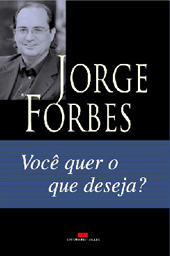/Prologue to the book Do You Want What You Desire?
Prologue to the book Do You Want What You Desire?, By Jorge Forbes (ed. Best Seller)
DO YOU WANT WHAT YOU DESIRE?


Do You Want What You Desire? points out to the rather usual fact of a person fighting for something and losing interest in it as soon as the thing is obtained.
Do You Want What You Desire? synthesizes many stories: of couples who start to argue on the first day of their honeymoon; of the employee who, ruined by success – in the words of Freud -, manages to be fired on the day of his/her promotion; of the tourist who loses his passport; finally, of the eternal disharmonies between the human being and the world.
Do You Want What You Desire? reveals that nothing that anybody may want is enough to satisfy the desire. To desire, as Lacan reminded us, is always to desire something else, to the point that we may even be grateful to those who refuse us what we have asked for.
Do You Want What You Desire? draws attention to the drama of changing times, from the industrial era – father-oriented – to the current, globalization era, in which no universal standard survives and in which, more than in the past, the distance between the self and the world is evident. Even miraculous solutions, such as the one proposed by the poet Carlos Drummond de Andrade – to change one’s name to Raimundo* -, at best will provide a rhyme, not a solution.
Do You Want What You Desire? talks about the anguish inherent to decision. There is no decision devoid of risk and not inducing a loss. The ailment called stress is nothing but a consequence of the fear of deciding, which leads to a cramming of options.
Do you want what you desire? is the question that pervades all the chapters of this book, which is divided into three parts: Chronicles, Lectures and Lacanians. Chronicles contains short texts, sometimes just a few lines, such as “Sonho Americano” (American Dream), which reveal the insistence of the Real – something that has no name and will never have one – in the many different moments of personal, family, political, economic daily life. Lectures brings five established texts from my last two annual seminars: The Unconscious and Responsibility: A New Love; and Shame, Honor and Luxury: Instruments for a Psychoanalytical Clinics of the Person and 21st Century Civilization. Lacanians addresses more specialized psychoanalytical issues, which might be followed by any interested reader.
Do you want what you desire?, the title of this book that gets inspiration from Jacques Lacan, invites every person to make him/herself this question, which, by not having a ready made answer, demands invention.
* The name Raimundo rimes, in Portuguese, with mundo, which means world.
_________________________________
Audio version, in Portuguese. Music by Lipe Forbes
Voice: Sérgio Viotti
